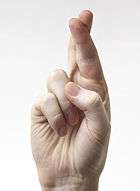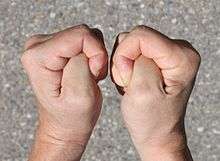Crossed fingers

To cross one's fingers is a hand gesture commonly used to wish for luck. Occasionally it is interpreted as an attempt to implore God for protection.[1] The gesture is referred to by the common expressions "cross your fingers", "keep your fingers crossed", or just "fingers crossed". Some people, mostly children, also use the gesture to excuse their telling of a white lie.[2] By extension, a similar belief is that crossing one's fingers invalidates a promise being made.[3]
Origin

The origin of the gesture traces back to the biblical Kingdom of Israel. Courts of Mosaic law would often render verdicts with the phrase "May God have mercy upon your soul" in order to reaffirm God's supreme authority over the law. Most judges felt that while they could pass a sentence of death upon a person, they personally did not have the authority to destroy souls and that only God had the authority to do that.[4][5][6][7][8] As a result, some judges would cross their fingers whenever they said the phrase as a result of concern for the criminal's soul as they said it as a prayer.[9][10][4][5]
Common usage of the gesture traces back to the early centuries of the Catholic Church. Common use of crossed fingers is found in the Christians who would cross their fingers in order to invoke the power associated with Christ's cross for protection, when faced with evil.[1] Moreover, Christians, when persecuted by the Romans, used the symbol of crossed fingers in order to recognize one another and assemble for Holy Mass. "When they were persecuted in Rome, Christians would secretly come together with the sign of the fish, and they would hold up their crossed fingers, as a Sign of the crossed emblem that had once been on the vestments of the army of Barabbas. It became a custom everywhere, for Christians when meeting, to make the sign of a cross by crossing their fingers." In 16th century England, people continued to cross fingers or make the sign of the cross in order to ward off evil, as well as when people coughed or sneezed.[11][12]
This superstition thus became popular among many early European Christian cultures. In some places, a comrade or well-wisher placed his index finger over the index finger of the person making the wish, the two fingers forming a cross. The one person makes the wish, the other empathizes and supports. Over centuries, the custom was simplified, so that a person could wish on his own, by crossing his index and middle fingers to form an X. But traces remain—two people hooking index fingers as a sign of greeting or agreement is still common in some circles today.
Charles Panati believes that the act of crossing one's fingers as a sign of luck or making a wish traces back to pre-Christian times, speculating that the cross was a symbol of unity and benign spirits dwelt at the intersection point.[13] A wish made on a cross was a way of "anchoring" the wish at the intersection of the cross until the wish was fulfilled.
Anecdotal use
The 1787 A Provincial Glossary, with a Collection of Local Proverbs, and Popular Superstitions by Francis Grose records the recommendation to keep one's fingers crossed until one sees a dog to avert the bad luck attracted by walking under a ladder.
Exception

In Vietnam the gesture is considered rude,[14][15] especially to another person. Referring to female genitals, it is comparable to the finger in western culture.
In German-speaking countries the gesture is only known for vitiating oaths. Wishing for luck is gestured by pressing thumbs. The same gesture is used in many Slavic countries such as Poland,[16] the Czech Republic, Slovakia, Bulgaria and ex-Yugoslav[17] republics. The same goes for Sweden.
See also
References
| Wikimedia Commons has media related to Fingers crossed. |
- 1 2 Orange Coast Magazine. Emmis Communications. May 1990. pg. 177. "In early Christian days, a believer confronted by evil or hostile influences implored the power of the Holy Cross for protection by twisting his middle finger over his forefinger and holding the remaining fingers down with his thumb."
- ↑ Field Guide to Gestures. Quirk Books. 2003. pg. 201. "Children are a big proponent of this gesture, though they usually use it when telling white lies, believing that having the fingers crossed behind the back makes it okay to fib."
- ↑ de Lint, Charles (2007). Widdershins. Macmillan. p. 287. ISBN 0765312859. Widdershins. Retrieved 2013-05-29.
To a child, forget ethics. Crossing your fingers while making a promise truly invalidated the promise.
- 1 2 Darrow, Clarence (2005). Closing Arguments: Clarence Darrow on Religion, Law, and Society (reprint ed.). Ohio University Press. p. 156. ISBN 0821416324.
- 1 2 Calvin, Jean (1816). Institutes of the Christian Religion, Volume 3 (H. Howe reprint ed.). Harvard University. p. 195.
- ↑ "Capital Punishment?". The Rotarian. Rotary International. November 1933. p. 61. ISSN 0035-838X.
- ↑ O'Donovan, Oliver (1999). From Irenaeus to Grotius. Wm. B. Eerdmans Publishing. p. 591. ISBN 0802842097.
- ↑ "Chicago Law Journal Weekly". 1. Law journal print. 1896. p. 61.
- ↑ "Full text of "Trial Of William Palmer"". Archive.org. Retrieved 2015-04-02.
- ↑ The Christian Register. 89. American Unitarian Association. 1910. p. 1159. ISSN 2158-1622.
- ↑ "Why do people cross their fingers for luck?". Ask Yahoo!. Yahoo!. October 17, 2002. Archived from the original on 2005-11-24. Retrieved 2013-05-29.
Faith in the power of the Christian cross, therefore, was strong. A cough, a sneeze, or even a mention of a cold (thought to be a sign of the plague) was reason enough to cross yourself. The proper way to make the sign of the cross involves four steps -- touch the forehead, heart, left shoulder, then right shoulder with you right hand. When a suspected witch crossed your path, you could make a cross shortcut by crossing your index and second finger or the index fingers of both hands. This would provide protection and ward off the evil influence.
- ↑ Good Housekeeping, Volume 226. International Magazine Company. 1998.
Crossing fingers: This was a Sign of the Cross that early Christians could use to avert bad luck without attracting the notice-and wrath-of pagans.
- ↑ Panati, Charles (1989). Extraordinary Origins of Everyday Things. William Morrow Paperbacks. ISBN 978-0060964191.
- ↑ https://weirdwonderfulvietnam.wordpress.com/2015/05/29/things-not-to-do-in-vietnam-1-crossed-fingers/
- ↑ https://vietnameselanguage.wordpress.com/2011/05/29/vietnamese-body-language-and-what-it-means/
- ↑ pl:Trzymanie kciuków
- ↑ Držati (nekom) palčeve.